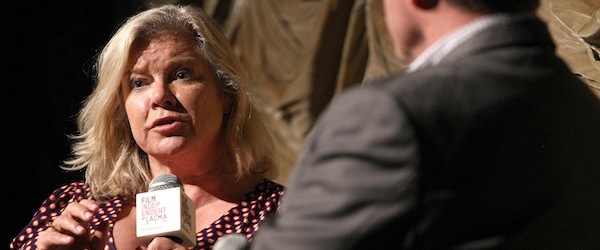Suffragette Producer Alison Owen on Telling the Erased History of a Movement
In the Q&A after last night’s screening of Suffragette at Film Independent at LACMA, producer Alison Owen admitted that she and her team had “a huge weapon” on their side during production.
What was it? “We were over 50 percent women in the crew,” she told Film Independent President Josh Welsh. “Brendan Gleeson said he’d never been on such an estrogen-filled set in his life.”
The film’s subject matter inspired the primarily female team making it: Suffragette tells the story of the women’s suffrage movement in England in the early 20th century, which has largely been neglected by the history books. “Women’s history is a very minor part of history [compared to] the history of powerful men [that we learn in school],” Owen said, “and working class women’s history is almost completely erased.”
Suffragette focuses on these women of the working class, the “foot soldiers” of the movement, because Owen, director Sarah Gavron and screenwriter Abi Morgan “wanted to bust apart that image of the sister suffragette—the sedate, drawing room, tea-drinking women with big hats who sat around discussing women’s rights.”
The film focuses on Maud Watts, played by Carey Mulligan, a young wife and mother who works long hours under brutal conditions. She doesn’t question her existence or the injustices that have shaped it until she becomes acquainted, entirely by accident, with the suffragette movement. She allows herself to be recruited, risking everything to fight for the cause.

Maud is a fictional character, a composite of many women of her station who became involved in the movement. Morgan pieced together Maud’s story “to find the essential truth of the plight of working class women at that time,” Owen explained. Her character exists alongside many who really did exist, however, including Edith Ellyn (Helena Bonham Carter), Emily Davison (Natalie Press), and, of course, Mrs. Emmeline Pankhurst (Meryl Streep).
Shot over 45 days for $14 million, Owen said that they worked hard to make the film on a grander scale than the “smaller, more intimate art house movie” they expected it would become during its early stages. “We felt very strongly that we needed to honor these women whose shoulders we’re standing on,” she said. “We wanted to really paint on a broad canvas, a big landscape and show their achievements in all their glory.”
Welsh commented on how refreshing and exciting it was to see a film with such an overwhelmingly female cast, crew and creative team, considering the consistently dismal statistics regarding women in the industry on both sides of the camera. While the numbers continue to disappoint, the conversation surrounding the issue is at an all-time high. Owen said that the greater awareness of feminist issues that characterizes the present moment has been very encouraging on her journey with Suffragette—and she’s thrilled that the film may help contribute to that awareness.
“We’re very lucky to have landed in kind of a feminist moment,” she said, citing Jennifer Lawrence’s open letter about the wage gap and the work of the Geena Davis Institute on Gender in Media. “So many things that lead me to believe that hopefully it’s not just a moment where feminism is a bit sexy and fashionable for a second, but a moment where we can actually all join forward and push open the door, and it might stay open this time.”
Mary Sollosi / Film Independent Blogger